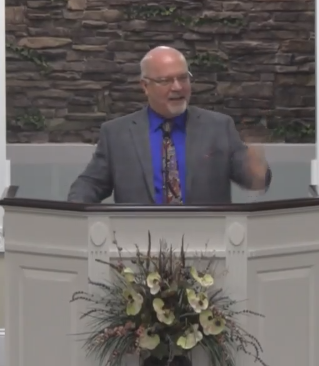According to Psych Central, “abuse is not always as obvious as being hit or shoved, called degrading names or cussed out. In fact, it can very well be underhanded or subtle. You may find yourself feeling confused about the relationship, off balance or like you are ‘walking on eggshells’ all the time. This is the kind of abuse that often sneaks up on you as you become more entrenched in the relationship. [We are] talking about psychological abuse, which is also known as mental or emotional abuse.”
Spiritual abuse, commonly played-out through any combination of physical, psychological and sexual abuse, is no different, other than that is usually hidden further under the guises of blindly following, never questioning, and certainly never criticizing the man of God. In our case, it took our family-life being turned upside down to finally realize that our church had changed into a toxic, spiritually abusive environment.
The Mass Exodus
Around the time of the church meeting about the pastor and his family, a mass exodus of approximately forty people began. Imagine a family that loved the Lord so much that they completely uprooted their family and moved six-hundred miles south for a Bible Institute. Not only did the Crawfords [name changed for privacy] become heavily involved in multiple ministries, but they were instrumental in organizing and beginning the greeter’s ministry, only to suddenly disappear. But people leave churches for different reasons, though, right? Surely, the head of security can become disgruntled too and decide his family needs to move on. Besides, his family only came from several states away, by faith, without any assurance of a steady income or place to live. It was only a few other families, including one who was close-knit with the pastor’s family, particularly the pastor’s wife. The number of people leaving around the same time was bewildering, but it really hit home when one of the youth leaders and his family said that that Sunday was their last service at Antioch Baptist Church. Every family that left was a pillar in our church, not only in ministerial involvement, but as people that truly loved the Lord, loved His people, and simply desired to please the Lord above all else. They were walking examples of compassion and of what God can do with lives that are sold out to Him.
But after losing about a third of our members within a few months’ time, our church was hurting. One could sense the pain, feeling the wounds and the bruises as if they were physically affixed to the auditorium walls. Still yet, we banded together and pressed forward. I tried to encourage the pastor and pastor’s wife, despite having a newborn to care for, but it seemed like they needed space more than anything. My family was struggling as well, just in a different way. It seemed that every time we got close to a family and started to develop a friendship, they left for one reason or another, but, thankfully, we managed to keep in contact with a few of them after they left.
Growing Tension
Following a visit with one family, whom, for their privacy, we will call the Martins, and after posting pictures of our children together online as well as with their new pet snake, the narcissistic man under the pastor, Douglas Stauffer, commented several times in passing that he noticed I spent time with a “snake.” Back when we first inquired of Pastor Andrew Ray if the Martins were all right and if they were still here, he confirmed they were no longer members, but also stated clearly that they did nothing worthy of having their membership removed. Despite this, when people found out we were still fellowshipping with them and any other families that left, it created a tension that could be cut with a knife. Nevertheless, we continued to move forward because people leave churches frequently for various reasons, and hurt feelings are a common part of the process. Over the next several months, still clueless of the situations that occurred, we attended regularly, served where we could with a newborn in tow, and tried to deepen friendships while hopefully developing other ones. Who were we to judge on either side?
Still, however, when the last two large families left, I had a sinking feeling that something could be terribly wrong. I pushed it out of the way for the time being because arguments happen between families, but I had previously witnessed the pastor’s family treating one of the William’s daughters [name changed for privacy] like last-year’s trash even though she absolutely adored them. Maybe her parents finally had enough and needed a new start. We did not know any details, but it still did not keep us out of the drama within the gossip-ridden inner circle.
Christmas Gift for the Pastor’s Family
Shortly before Christmas time, a dilemma came up in conversation within the walls of the nursery: no one was taking care of organizing the annual monetary Christmas gift to the pastor’s family and the pastor’s wife was distraught. The families who usually made sure everything went smoothly had either left, were overloaded at the church in order to compensate for the workers we had lost, or they had recently welcomed new children into their families. Now, on top of trying to throw together the last-minute details of a party/fellowship because of a lack of response to the emails, no one took charge of collecting the money for the pastor’s family! According to the pastor’s wife, Mrs. Ray, her family counted on this gift every year to buy Christmas gifts for their children, and there were people that would be extremely disgruntled that they did not know how to give. My husband enthusiastically and willingly stepped up to the plate, offering to organize the annual giving in the years to come. I have yet to fully understand why this still bothers me so much, but it was another red flag that priorities and focus may have been misplaced.
The Pastor’s Paranoia of Criticism
Around the time of Pastor Andrew Ray’s fortieth birthday, the church planned a celebration with caution tape, caution hats, and decorations supporting the warning of our pastor becoming an old man. Everyone was taking pictures, but there was rumor that none of the pictures of pastor were to be posted online, despite numerous pictures being permitted in the past. I approached Pastor Ray to ask him directly, to make sure that it would not be problem, and his response was that they have a lot of critics right now who will find fault in anything. They did not want to give them any ammunition.
Around the same time, he began to post strong statements and opinions on his Facebook for all to see, but as soon as there was any question or objection, he seemed to take them as personal attacks. A disagreement about if children should be encouraged to go to college resulted in several husbands (mine included) being tagged in the post and quickly ended. Previously, he always encouraged discussion and differences of opinion, but now, any variance appeared to be taken personally.
Just one example of such public statements online is about criticism: “Criticizing one who is responsible to God for a decision is easy when you are not the one responsible to God for the decision.” While accurate, it conveys the idea that one should never question the pastor or disagree with his actions because he supposedly has this high calling of God. We are all individually accountable to God for our actions, and how we respond to others and the Holy Spirit.
A Single Statement
Near the beginning of the following year, when meeting with the pastor about something completely unrelated to the mass exodus, Pastor Ray made a comment that sent off instant red flags in my mind. He talked about men who came to Antioch Baptist Church, sold-out to God and were sure that this is where God wanted them and their family. Upon bringing their families, however, their wives have issues with the Biblical teachings of submission, and they would pull their husbands away from where God was leading them. I could not shake the idea that he was likely referring to the precious family from the north, the Crawfords [name changed for privacy], who had come down here for the Bible Institute. Mrs. Crawford, a sweet, gentle Christian mother, was an extrovert and an independent woman, traits frowned upon in a church that feels threatened by women. This is the point where I finally started to have doubts about the health of the church my family had called home for four years, because a woman is more than a mindless doormat that is only capable of manipulating and leading her husband astray from God. I later found out, however, that people were already questioning our loyalty because of continuing to fellowship with the families that left.
“Howard Hendricks says there are two kinds of people in the church: the pillars and the caterpillars. The pillars uphold the church with their prayers, their work, and their donations. They build the kingdom of God by the sweat of their brows. The caterpillars crawl in on Sunday morning, sing a few songs, listen to a sermon, and crawl out again, not to be seen for a week.’ From Why Men Hate Going to Church by David Murrow, page 18.”- Posted on Andrew Ray’s Facebook wall in April of 2018
Feuerman, Marni. “21 Warning Signs of an Emotionally Abusive Relationship.” World of Psychology, 8 July 2018, https://web.archive.org/web/20180202070321/https://psychcentral.com/blog/21-warning-signs-of-an-emotionally-abusive-relationship/.
In this series I share my thoughts and opinions concerning these ministers and the events which led to my departure. Click here to continue reading: “Blindsided: Circumcising the Critics- Sermon #1” or click on the link below.
For a list of the complete series, click here.
********
Shop at our Amazon store! As an Amazon Influencer, this website earns from qualifying purchases.





